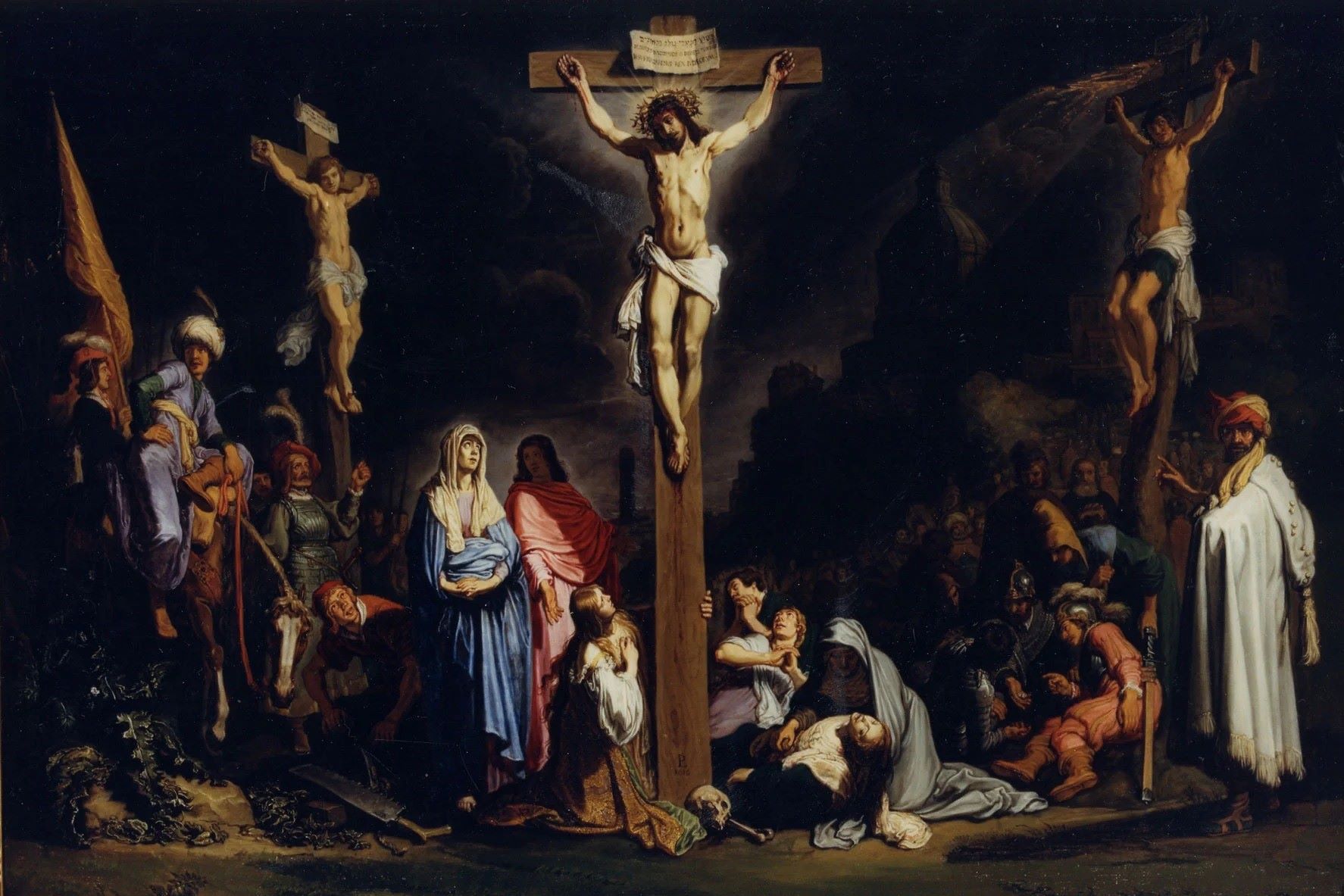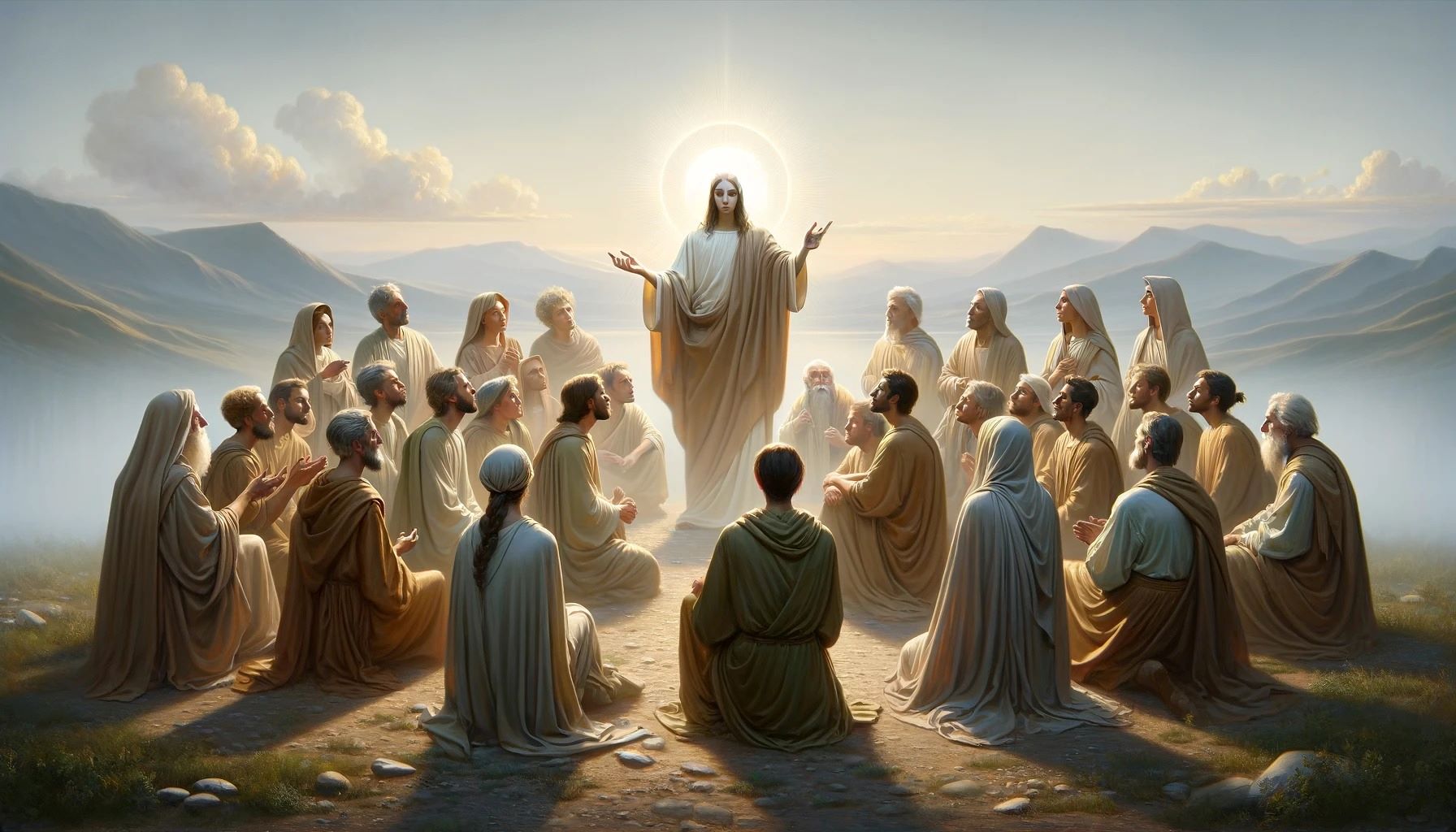Home>Christian Videos>Bible Stories>What Does The Church Of Christ Believe About Jesus


Bible Stories
What Does The Church Of Christ Believe About Jesus
Published: March 2, 2024
Peter Smith, Editorial Director at Christian.net, combines deep insights into faith, politics, and culture to lead content creation that resonates widely. Awarded for his contributions to religious discourse, he previously headed a major organization for religious communicators, enhancing dialogue on faith's societal impacts.
Discover what the Church of Christ believes about Jesus and his role in Bible stories. Explore our faith and teachings on the life of Jesus.
(Many of the links in this article redirect to a specific reviewed product. Your purchase of these products through affiliate links helps to generate commission for Christian.net, at no extra cost. Learn more)
Table of Contents
Introduction
What Does The Church of Christ Believe About Jesus?
The Church of Christ believes in the divinity and humanity of Jesus Christ, as well as His role in salvation and the promise of His second coming. This article will delve into the core beliefs of the Church of Christ regarding Jesus, shedding light on the significance of His deity, humanity, role in salvation, and the anticipation of His second coming. Understanding these beliefs is essential in comprehending the foundation of the Church of Christ's faith and its teachings about Jesus Christ.
The Deity of Jesus
-
Divine Nature: The Church of Christ firmly believes in the divinity of Jesus Christ. According to their doctrine, Jesus is not merely a prophet or a moral teacher, but the Son of God, part of the Holy Trinity. They hold that Jesus is fully divine, possessing the same nature as God the Father and the Holy Spirit. This belief is rooted in the teachings of the New Testament, where Jesus is referred to as the "Son of God" and is ascribed divine attributes and authority.
-
The Trinity: The Church of Christ upholds the doctrine of the Trinity, which asserts that God exists as three persons in one essence: the Father, the Son (Jesus Christ), and the Holy Spirit. They believe that Jesus, as part of the Trinity, shares in the divine nature and is worthy of the same honor and worship as the Father and the Holy Spirit. This belief distinguishes the Church of Christ from other Christian denominations that may hold different views on the nature of Jesus.
-
Savior of Mankind: Jesus' divinity is central to the Church of Christ's understanding of salvation. They believe that through His divine nature, Jesus was able to offer the perfect sacrifice for the sins of humanity, providing a way for reconciliation with God. His divinity is seen as essential in bridging the gap between God and humanity, offering the gift of eternal life to those who believe in Him.
-
Biblical Foundation: The belief in the deity of Jesus is grounded in the teachings of the Bible, particularly in the New Testament. The Church of Christ emphasizes the importance of scriptural authority and finds ample support for the divinity of Jesus in passages such as John 1:1, where it is stated, "In the beginning was the Word, and the Word was with God, and the Word was God."
-
Worship and Adoration: Due to their belief in the divinity of Jesus, members of the Church of Christ engage in worship and adoration of Jesus Christ as the Son of God. They view Jesus as worthy of praise, honor, and obedience, acknowledging His divine authority and role in the redemption of humanity.
Understanding the Church of Christ's belief in the deity of Jesus provides insight into the foundational principles that shape their faith and worship. This belief underscores the significance of Jesus Christ as the divine Son of God, the Savior of humanity, and a central figure in the Christian faith.
The Humanity of Jesus
-
Fully Human and Fully Divine: The Church of Christ affirms the full humanity of Jesus Christ. They believe that Jesus, while being fully divine, also took on human form, experiencing the full range of human emotions, physical limitations, and temptations. This belief is rooted in the understanding that Jesus, as the Son of God, willingly chose to enter into human existence, living a life that exemplified both divinity and humanity.
-
Incarnation: Central to the Church of Christ's belief in the humanity of Jesus is the doctrine of the Incarnation. They hold that Jesus, the Word made flesh, dwelt among humanity, taking on a human body and experiencing the joys and struggles of human life. This concept emphasizes the intimate connection between God and humanity through the person of Jesus Christ, highlighting the significance of his human nature.
-
Identifying with Humanity: The Church of Christ emphasizes that Jesus' humanity allows him to identify with the experiences and challenges faced by humanity. They believe that Jesus' earthly life serves as a model for how to navigate the complexities of human existence, demonstrating compassion, empathy, and understanding towards the struggles of individuals.
-
Suffering and Temptation: The Church of Christ acknowledges that Jesus, in his humanity, experienced suffering, temptation, and the limitations of human existence. They find significance in the fact that Jesus, despite being divine, willingly endured the hardships of human life, demonstrating solidarity with humanity and providing an example of perseverance and faith in the face of adversity.
-
Scriptural Basis: The belief in the humanity of Jesus is firmly grounded in the teachings of the Bible, particularly in the New Testament accounts of Jesus' life, ministry, and interactions with people. The Church of Christ finds support for this belief in passages such as Hebrews 4:15, which states, "For we do not have a high priest who is unable to empathize with our weaknesses, but we have one who has been tempted in every way, just as we are—yet he did not sin."
-
Relational Aspect: Emphasizing Jesus' humanity underscores the relational aspect of the Church of Christ's faith. They believe that Jesus' human experiences enable believers to connect with him on a personal level, understanding that he can empathize with their struggles and provide comfort and guidance in navigating the complexities of life.
Understanding the Church of Christ's belief in the humanity of Jesus reveals the depth of their faith and the significance of Jesus' dual nature as both fully divine and fully human. This belief underscores the intimate connection between God and humanity through the person of Jesus Christ, shaping the way members of the Church of Christ relate to and emulate the life of Jesus.
The Role of Jesus in Salvation
-
Atonement for Sin: The Church of Christ places significant emphasis on the role of Jesus in providing atonement for the sins of humanity. They believe that Jesus' sacrificial death on the cross served as the ultimate payment for the sins of all people, offering a path to reconciliation with God. This belief aligns with the biblical teaching that Jesus' death was a substitutionary atonement, where he bore the punishment that humanity deserved, thereby making salvation accessible to those who place their faith in him.
-
Redemption and Forgiveness: According to the teachings of the Church of Christ, Jesus plays a central role in the redemption and forgiveness of sins. His sacrificial death and subsequent resurrection are viewed as the means through which individuals can experience forgiveness for their transgressions and be redeemed from the power of sin. This belief underscores the transformative power of Jesus' work in bringing about spiritual renewal and reconciliation with God.
-
Grace and Faith: The Church of Christ emphasizes that salvation is made possible through the grace of God, which is manifested in the person of Jesus Christ. They teach that individuals receive the gift of salvation through faith in Jesus, acknowledging him as the Son of God and the Savior of the world. This emphasis on grace and faith highlights the foundational role of Jesus in facilitating a restored relationship between humanity and God, based on the unmerited favor extended through his redemptive work.
-
New Life in Christ: The Church of Christ teaches that through Jesus, individuals are offered the opportunity for a new life characterized by spiritual transformation and a renewed relationship with God. They believe that accepting Jesus as Lord and Savior leads to a profound change in one's identity and purpose, as they become partakers of the divine nature and are empowered to live in accordance with God's will. This understanding of salvation as a transformative journey reflects the pivotal role of Jesus in bringing about spiritual rebirth and growth in the lives of believers.
-
Eternal Hope: Central to the Church of Christ's belief in the role of Jesus in salvation is the assurance of eternal hope. They affirm that through Jesus' redemptive work, believers have the promise of eternal life in the presence of God. This hope is grounded in the belief that Jesus' resurrection conquered death and secured the prospect of a future existence free from sin and suffering, where believers will dwell in the presence of God for eternity.
-
Mission and Witness: The Church of Christ emphasizes the responsibility of believers to share the message of Jesus' redemptive work with others, inviting them to partake in the salvation offered through faith in Christ. They view Jesus' role in salvation as a catalyst for mission and witness, compelling believers to proclaim the good news of reconciliation and hope found in Jesus Christ. This understanding underscores the transformative impact of Jesus' role in salvation, not only on individual lives but also on the collective mission of the Church to extend the invitation of salvation to all.
Understanding the Church of Christ's belief in the role of Jesus in salvation illuminates the foundational significance of Jesus' redemptive work in facilitating reconciliation, forgiveness, and eternal hope for humanity. This belief shapes the way members of the Church of Christ approach their faith, mission, and relationship with God, underscoring the transformative impact of Jesus' role in the salvation of believers.
The Second Coming of Jesus
-
Anticipation of His Return: The Church of Christ fervently anticipates the second coming of Jesus Christ. They believe in the biblical promise of Jesus' return, as foretold in the New Testament scriptures. This belief instills a sense of hope and expectation among members of the Church of Christ, as they eagerly await the fulfillment of Jesus' promise to return and establish His eternal kingdom.
-
Eschatological Hope: The doctrine of the second coming of Jesus holds a central place in the eschatological hope of the Church of Christ. They view the return of Jesus as the culmination of God's redemptive plan for humanity, signaling the ultimate victory over sin, evil, and death. This belief in the future return of Jesus shapes the way members of the Church of Christ approach their present lives, instilling a sense of purpose and readiness for the fulfillment of God's ultimate purposes.
-
Judgment and Restoration: The Church of Christ believes that the second coming of Jesus will be accompanied by the final judgment, where all individuals will be held accountable for their actions and choices. They hold that Jesus' return will bring about the restoration of all things, ushering in a new heaven and a new earth where righteousness and justice prevail. This belief underscores the significance of Jesus' role as the ultimate judge and the agent of divine restoration.
-
Transformation and Renewal: The anticipation of Jesus' return motivates members of the Church of Christ to live in a manner that reflects readiness for His coming. They believe that the prospect of Jesus' return inspires personal transformation, spiritual renewal, and a commitment to living in accordance with the teachings of Jesus. This understanding of the second coming as a catalyst for personal and communal renewal shapes the way members of the Church of Christ engage with their faith and the world around them.
-
Mission and Evangelism: The belief in the second coming of Jesus fuels the mission and evangelistic efforts of the Church of Christ. They view the anticipation of Jesus' return as a driving force for sharing the message of salvation with others, inviting them to embrace the hope found in Jesus Christ. This belief underscores the urgency of proclaiming the gospel and making disciples, as the Church of Christ seeks to prepare individuals for the imminent return of Jesus.
-
Eternal Hope and Assurance: The doctrine of the second coming of Jesus provides believers with the assurance of eternal hope. The Church of Christ holds that Jesus' return signifies the fulfillment of God's promise of eternal life for those who have placed their faith in Him. This hope serves as a source of comfort, encouragement, and perseverance, as members of the Church of Christ navigate the challenges of life with the assurance of a future redeemed by the return of Jesus Christ.
Understanding the Church of Christ's belief in the second coming of Jesus illuminates the profound impact of this doctrine on their faith, mission, and outlook on the future. This belief shapes the way members of the Church of Christ live, worship, and engage with the world, as they eagerly anticipate the fulfillment of God's ultimate purposes through the return of Jesus Christ.















